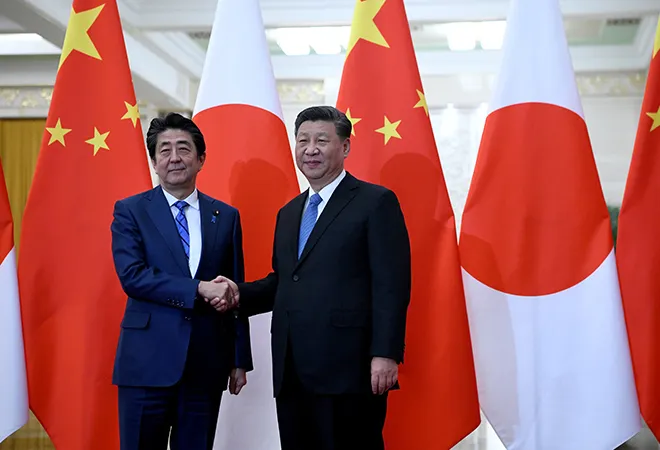
Since the outbreak of the Covid-19 pandemic, Japan-China relations have witnessed some serious twists and turns. One major disappointment for both countries was the postponement of the much-anticipated Chinese President Xi Jinping ‘s visit to Japan in the month of April. After years of turbulence and uncertainty in the bilateral relations, Japanese Prime Minister Shinzo Abe succeeded in getting Xi to agree to make a state visit to Japan in April. Official visits by the topmost Chinese leaders to Japan have happened only once in ten years in recent years. Even Xi would have made his state visit after a gap of more than ten years. Such being the case, both countries were keen to use this visit to redefine their bilateral ties in the volatile geo-strategic Asian situation and usher in a new epoch in their partnership.
But that was not to be. Coming under the crippling influence of the Covid-19 crisis, both Xi and Abe mutually agreed to postpone the visit without suggesting any future date. In a way, Xi’s visit became a casualty of the Covid-19 crisis.
Yet, both countries pursued mutual cooperation during the initial days of the epidemic and China allowed the Japanese government to evacuate hundreds of Japanese back to Japan. Further, China also supplied large quantities of essential things like masks, gowns and even medicines needed by the Japanese. But soon, as the US-China relations became seriously strained on issues like bilateral trade and the role of the World Health Organisation (WHO) in the Covid-19 crisis, Japan, in a way, was caught in the crossfire between the two. In particular, President Donald Trump’s criticism of China’s alleged role in the spread of the virus created a great deal of discomfort for the foreign policy establishment in Japan.
Additionally, the Taiwan factor also figured quite prominently to further complicate their relations. There were many political groups within Japan’s ruling Liberal Democratic Party ( LDP) that did not make secret of their happiness at the re-election of President Tai Ing-wen around that time. More importantly, LDP top leaders, including Prime Minister Abe and the Chief Cabinet Secretary Yoshihide Suga, urged that Taiwan be permitted to take part in the deliberations of the WHO as an observer. Needless to state that this was strongly resented by China.
On 5 March, an official announcement on the postponement of President Xi’s visit to Japan was made. On the same day, Prime Minister was addressing the Council of Investments for the Future, expressing his deep concerns about the perils of Japan’s supply chains being unduly reliant on China. This was brought to light particularly during the early days of the corona virus epidemic when Japan was running short of essential requirements like face masks, medical gowns and medicines due to the discontinuance of Chinese supply chains.
It may be noted that China accounted for 70 to 80% of Japan’s protective equipment like gowns and masks. Japanese manufacturers are not well-placed to augment the output of these products and strangely some electrical companies like the Sharp have volunteered to enter this field. It was under these circumstances that he underlined the need for Japan to pursue a new policy that would relocate to Japan the production bases for those products which were highly dependent on China. As for other products that did not come under this category, he would like to diversify their production bases among other countries like the ASEAN Group.
Soon two important policy decisions were taken by the government with a view to execute the new policy of bringing the production bases back to Japan. First, 0n 7 April, it allocated a sum of $2.3 billion in its supplementary budget to encourage Japanese companies to shift to Japan or to diversify their bases in Southeast Asia.
Second, in the same month, the National Security Council (NSC) set up a special economic team tasked with formulating a new strategy for national economic security before the end of the year. For the first time, a high official of the Ministry of Economy, Trade and Industry ( METI) was inducted into the team with a clear objective to take into account the imperatives of the national economic security.
According to reports, the new initiative taken by Abe caused considerable anxieties among the top leaders of the Chinese government who were checking with many Japanese companies on their future course of action. Does Abe’s new policy mean that there will be an exodus of Japanese companies back to Japan?
This is not the first time that Japanese companies based in China are being called to return and set up their manufacturing bases at home. Sino-Japanese economic relations are old, massive and complex encompassing a wide spectrum of interests. Even at the peak of cold war, the Japanese managed to maintain their trade with Beijing under the rubric called “seikei bunri” (separation of economics from politics).
Today China is the biggest trading partner of Japan and there are thousands of Japanese companies doing their business in that country. They have seen the highs and lows in their dealings with China. Further, with a limited budgetary allocation of $2.3 billion, it would be next to impossible to expect the Japanese companies to leave China. But still Abe’s initiative, though not new, is still important, because it gives a timely notice to China to clearly understand Japan’s true sentiments. Prof Shin Kawashima has summed up the situation aptly thus: “supply chains between Japan and China will remain intact, the Chinese market is still important and Japan is not encouraging a decoupling from China.”
The crux of Japan’s China dilemma lies in the delicate balancing act it plays between its dependence on the US for its security needs and the enormous economic benefits it derives from China. Hong Kong provides yet another case to prove this. The former British colony, home to about 1400 Japanese companies, accounts for 2.5% of Japan’s total trade. On 28 May, Japan declined to join the US, UK, Australia and Canada in issuing a statement condemning China on its new security legislation in Hng Kong. Japan clarified its position by saying that it would be more appropriate to use the G-7 Group to criticise China. But many see again the delicate balancing act of Japan.
The views expressed above belong to the author(s). ORF research and analyses now available on Telegram! Click here to access our curated content — blogs, longforms and interviews.




 PREV
PREV


